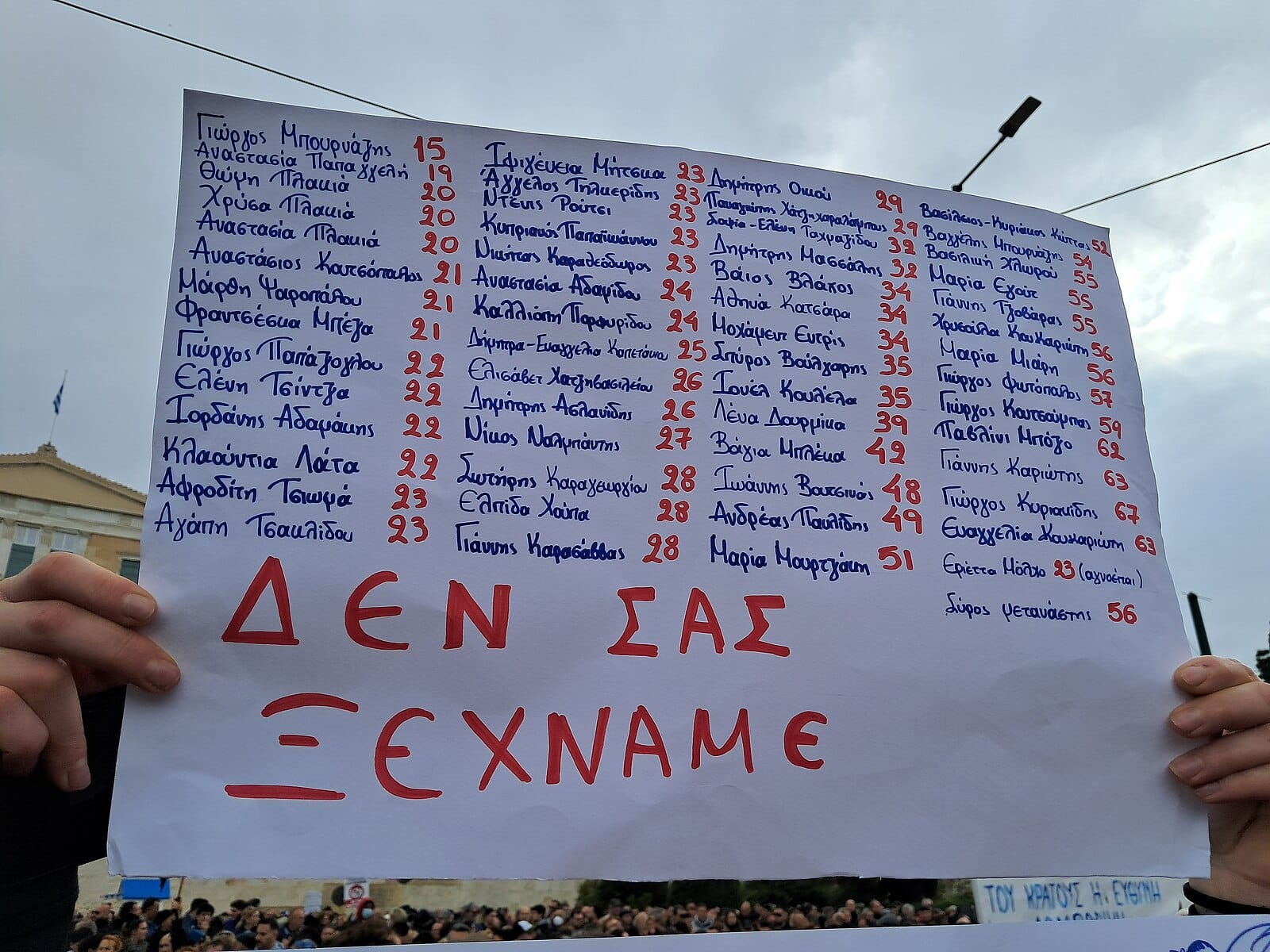Friends have been reaching out, trying to understand the cause of the massive demonstrations currently unfolding across Greece. What could be behind such widespread mobilisation, involving everyone from young children to elderly men and women, unions, collectives, and people who have never before participated in protests? And what is the cause of the police violence they are witnessing?
A simple answer might be that people are demonstrating in memory of the victims of the ‘Tempi’ train crash. On the night of 28 October 2023, a passenger train collided with a freight train on the tracks between Athens and Thessaloniki in the Tempi valley. The collision resulted in 57 deaths – most of them young people – while a young girl is still missing, a young boy still fighting for his life after suffering serious injuries, and many others are injured, some critically. Perhaps even more significantly, it left behind a collective trauma that has yet to heal.
The Tempi incident wasn’t just a tragic event – it was the result of cuts to staffing made by the private operator, Hellenic Train. It reflects the inadequate maintenance, even absence, of necessary safety systems on the railways by the state-owned Hellenic Railway Organisation (OSE), which manages the public railway infrastructure. More crucially, it is a direct consequence of the Greek state’s indifference and failure to enforce necessary regulations and controls.
This event is the product of a system that prioritises profits over human lives: profits for the now-privatised transport services, contractors, and construction companies who secure lucrative deals through rigged tenders. A toxic blend of state neglect and corporate greed leads to the devaluation of the lives of workers and passengers.
In the aftermath of the crash, the families and friends of the victims – who had to collect and bury burned, dismembered bodies – were met by a government trying to conceal the truth and divert attention from those truly responsible. The authorities quickly tampered with the crime scene, erasing evidence that could have revealed the cause of the explosion and fire. They manipulated and leaked communications between train traffic managers, pushing a narrative that blamed the station master. They initially concealed, then erased, video evidence showing the freight train’s cargo, and silenced workers who spoke out about the lack of safety measures.
Government officials, including Prime Minister Kyriakos Mitsotakis, attacked anyone calling for accountability. They labelled calls for truth and justice as “conspiracy theories”, dismissed the incident as a series of minor operational errors, and accused opposition parties of attempting to exploit the event for political gain.
But they were met with fierce resistance from the victims’ families and supporters. They encountered the frustration and exhaustion of a society that has watched its people’s lives devalued over years – through precarious work, home seizures by banks, understaffed hospitals, and an underfunded education system. This time, people had had enough, and they took to the streets under the slogan “I have no more oxygen”, quoting from a leaked audio recording of a young girl’s emergency call to a 112 operator just before she lost her life in the crash. Millions gathered in more than 350 cities in Greece and abroad, in what is considered by many as the most numerous protests in the history of Greece.
In response to the demand for “oxygen,” the government unleashed tear gas and brutal police repression, chasing, beating, and prosecuting dozens of protesters, trying to instil fear. This fear seems unable to suppress the rising anger.
Justice for yet another state crime will be a long time coming, just as justice has yet to be served for the Pylos shipwreck, or for the migrants who have lost their lives while seeking safety, or for those who have died in police stations, police pursuits and roadblocks, or unsafe work environments.
Some are trying to frame the Tempi event as another “ancient Greek tragedy”. But the train collision in Tempi is not a metaphorical play – it is a clear-cut case of a capitalist-state crime. The “catharsis” that will shape the next generation’s future will not come from divine intervention on Mount Olympus. It will come from the young men and women who have taken to the streets across Greece.
We can only stand with them.




